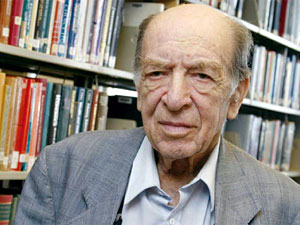
Born: August 21, 1917, Moscow, Russia
Died: June 24, 2008, Minneapolis, MN, USA
Summary. "He took real delight in talking to students. He did all that because he treated everybody as his intellectual equal, even though the vast majority of us were not," says Chari a colleague from University of Minnesota. "He treated us all with respect for our intelligence, and an assumption that we knew what we were talking about."
Early days. Hurwicz was born to a Polish-Jewish family a few months before the October Revolution. The family had lived in Congress Kingdom (the part of Poland then within the Russian Empire) but had been displaced by World War I. The family returned to Warsaw, Poland in 1919. Encouraged by his father to study law, Hurwicz received in 1938 his LL.M. degree from Warsaw University, where he discovered his future vocation in economics class. He then studied in 1938-39 at the London School of Economics. In 1939 he moved to Geneva where he studied at the Graduate Institute of International Studies. In 1940, after moving to the United States, he continued his studies at Harvard University and the University of Chicago. During this time his parents and brother fled Warsaw, only to be arrested and sent to Soviet labor camps. Hurwicz married Evelyn Jensen in 1944 and later lived in Minneapolis, Minnesota. They have four children, Sarah, Michael, Ruth and Maxim. He has interest in linguistics, archaelogy, biochemistry and music.
Early career. In 1941 Hurwicz was a research assistant to Paul Samuelson (later Nobel Prize winner) at the Massachusetts Institute of Technology and to Oskar Lange at the University of Chicago. At Illinois Institute of Technology during the war, Hurwicz taught electronics to the U.S. Army Signal Corps. From 1942 to 1944, at the University of Chicago, he was a member of the faculty of the Institute of Meteorology and taught statistics in the Department of Economics.
Teaching and research. Hurwicz received a Guggenheim Fellowship in 1945–1946. In 1946, he became an associate professor of economics at Iowa State College. From January 1942 until June 1946, he was a research associate for the Cowles Commission. In 1950 he was also a research professor of economics and mathematical statistics at the University of Illinois, through the University of Chicago a consultant to the RAND Corporation, and a consultant to the U.S. Bureau of the Budget. Hurwicz continued to be a consultant to the Cowles Commission until about 1961. In 1955 and again in 1958 he was a visiting professor, and later a fellow, at Stanford University and there in 1959 published "Optimality and Informational Efficiency in Resource Allocation Processes" on mechanism design. He was recruited to the University of Minnesota in 1951, where he became a professor of economics and mathematics in the School of Business Administration. In 1961 Hurwicz became chairman of the School of Statistics at the University of Minnesota. He taught at Bangalore University in 1965. In 1969 he became Regents Professor of Economics, and in 1989 Curtis L. Carlson Professor of Economics. During the 1980s he taught at Tokyo University, People's University of China and the University of Indonesia. In the U.S. he was a visiting professor at Harvard in 1969, at the University of California, Berkeley in 1976, at Northwestern University twice, in 1988 and 1989, at the University of California, Santa Barbara in 1998, at the California Institute of Technology in 1999, and at the University of Michigan in 2002. He was a visiting Distinguished Professor at the University of Illinois in 2001. He is internationally renowned for his pioneering research on economic theory, particularly in the areas of mechanism and institutional design and mathematical economics. In the 1950s, he worked with Kenneth Arrow on non-linear programming; in 1972 Arrow became the youngest person to receive the Nobel Economics prize. Hurwicz was the graduate advisor to Daniel McFadden, who received the Nobel prize in 2000. Hurwicz' work was instrumental in showing how economic models can provide a framework for the analysis of systems, such as capitalism and socialism, and how the incentives in such systems affect members of society. The theory of incentive compatibility that Hurwicz developed changed the way many economists thought about outcomes, explaining why centrally planned economies may fail and how incentives for individuals make a difference in decision making. Hurwicz serves on the editorial board of several journals. He co-edited and contributed to two collections for Cambridge University Press: Studies in Resource Allocation Processes (1978) and Social Goals and Social Organization (1987).
Awards and honors. 1947 fellow of the Econometric Society (later its president); 1948 served on the United Nations Economic Commission ; 1954 served in the U.S. National Research Council; 1965 inducted into the American Academy of Arts and Sciences; 1974 inducted into the National Academy of Sciences; 1977 was named a Distinguished Fellow of the American Economic Association; 1984 Distinguished Scholar of the California Institute of Technology; 1990 National Medal of Science; 2007 Nobel Prize in Economics (shared with Eric Maskin and Roger Myerson).
Hurwicz has received six honorary doctorates: from Northwestern University (1980), Universitat Autònoma de Barcelona (1989), the University of Chicago (1993), Keio University (1993), Warsaw’s Szkola Glowna Handlowa (1994) and Universität Bielefeld (2004). He is an honorary visiting professor of the Huazhong University of Science and Technology School of Economics (1984).
The Leonid Hurwicz Distinguished Lecture is given to the Minnesota Economic Association .
Hurwicz served in 1968 as a Minnesota delegate to the Democratic Party Convention and was a member of the Democratic Party Platform Committee.
This article uses mostly material from the Wikipedia article "Leonid Hurwicz" licensed under the GNU Free Documentation License. :
Wikipedia
All text is available under the terms of the GNU Free Documentation License.
Other sources of information:
Nobel Prize
Return to home page:
Prominent Poles